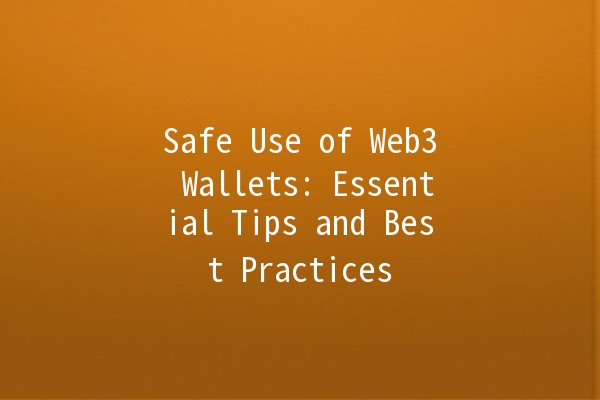
In the rapidly evolving landscape of digital finance, ensuring the safety of your assets within Web3 wallets is paramount. As cryptocurrencies and decentralized applications (dApps) gain popularity, the need for secure wallet practices has never been greater. This article outlines essential tips and strategies to protect your Web3 wallet, explores common pitfalls, and enhances your digital asset management experience.
Understanding Web3 Wallets
Web3 wallets serve as gateways to the decentralized internet, allowing users to store, manage, and interact with cryptocurrencies and decentralized applications. Unlike traditional wallets, Web3 wallets provide users with control over their private keys, offering both flexibility and responsibility.

Types of Web3 Wallets
Understanding the types of wallets helps in choosing the right one based on your needs and risk appetite.
Essential Tips for Securely Using Web3 Wallets
To cultivate a secure experience with your Web3 wallet, consider implementing the following tips:
Explanation
Creating a robust password and utilizing 2FA significantly increases your wallet's security. Passwords should contain at least 12 characters, mixing letters, numbers, and symbols.
Practical Application
When setting up your wallet, choose a complex passphrase. In addition, activate 2FA through methods such as SMS verification, mobile apps (like Google Authenticator), or hardware keys (like YubiKey) to add another layer of security.
Explanation
Running outdated wallet software can expose your assets to vulnerabilities that hackers can exploit. Always ensure that your wallet and operating system are running the latest versions.
Practical Application
Set up automatic updates when possible. Regularly check the official website or store for any available updates, and read the release notes to understand any changes or enhancements made to the wallet software.
Explanation
Phishing scams are prevalent in the digital currency space. Scammers often impersonate websites or services to steal your private keys or login details.
Practical Application
Always verify URLs before entering personal information. Use bookmarks for important sites, avoid clicking on links from emails or messages, and scrutinize website details. If you receive unsolicited communication about your wallet, do not engage without verifying the legitimacy through official channels.
Explanation
Backing up your wallet ensures that you can access your funds if your device is lost, stolen, or damaged. It typically involves saving your seed phrase or recovery phrase.
Practical Application
Store your wallet backup in a secure location, both digitally (encrypted storage) and physically (written down and stored in a safe place). Test your backup periodically by attempting to restore the wallet to ensure you can regain access to your assets.
Explanation
Hardware wallets provide a secure way to store significant amounts of cryptocurrency offline. They are resistant to malware and hacking attempts.
Practical Application
If you own a considerable amount of digital assets, purchase a reputable hardware wallet (such as Ledger or Trezor). Keep the device in a safe or a secure location and only connect it to a secure computer when making transactions.
Addressing Common Concerns and Questions
Q1: What should I do if I think my wallet has been compromised?
If you suspect that your wallet has been compromised, immediately stop all transactions and transfer your assets to a safer wallet. Change your passwords and enable 2FA where necessary. Report the incident to the wallet provider for assistance.
Q2: How can I tell if a wallet is legitimate?
Research is crucial. Verify the wallet's reputation by checking reviews on reputable sites and forums. Look for opensource wallets, as they tend to have greater transparency. Assess any security audits performed by thirdparty firms.
Q3: Is it safe to connect my wallet to dApps?
Connecting your wallet to dApps carries inherent risks. Always use reputable dApps, check user feedback, and only interact with applications that have transparent security practices.
Q4: What are gas fees, and how do they affect my transactions?
Gas fees are transaction fees required to process operations on blockchains like Ethereum. Gas prices fluctuate based on network congestion. Understanding how gas fees work helps in budget planning for transactions as you may want to time transactions when fees are lower.
Q5: Can I use multiple wallets for different purposes?
Absolutely! Many users maintain several wallets for different purposes—one for frequent transactions, another for longterm holding, and a specific wallet for dApp interactions. This method can enhance security and organization.
Q6: What is a seed phrase, and why is it important?
A seed phrase is a series of words generated by your wallet, serving as the key to access your wallet and assets. It’s crucial for recovery. Store it securely offline, as anyone with access to this phrase can control your funds.
By implementing these best practices, you can significantly enhance the security of your Web3 wallet. The world of decentralized finance offers numerous benefits, but it also comes with responsibilities. Stay informed, proactive, and vigilant as you navigate this exciting landscape.
Ensuring your digital assets' safety is a continuous journey; prioritize security and embrace best practices to maximize your experience while mitigating risks. Interact with this innovative space wisely, and stay ahead of potential threats with diligence and awareness.

